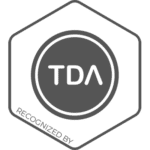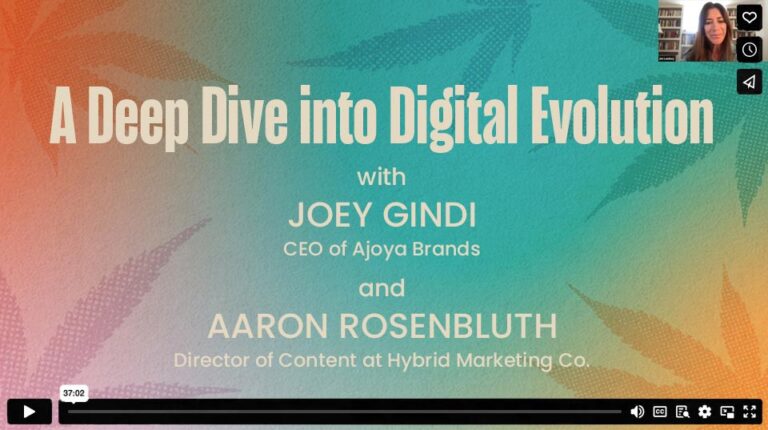Host: Jen Lamboy, Director of Strategy, Hybrid Marketing Co.
Guests: Joey Gindi, CEO of Ajoya Brands &
Aaron Rosenbluth, Director of Content at Hybrid Marketing Co.
Jen Lamboy, Director of Strategy, Hybrid Marketing Co.
So right now I’m reading John Markoff’s book, “What the Dormouse Said: How the 60s Counterculture Shaped the Personal Computer Industry.” It was a recommendation from our friend Jeremy Johnson over at Dispense. It’s a great book so far. So one account pins the birthplace of the personal computer with a two man group on the San Francisco mid-Peninsula, Steve Jobs and Woz. Woz is someone who I love watching and hearing from and following. My brother was obsessed. So I always enjoy any kind of material around him of course.
And the other group was in Palo Alto with Xerox. So these two groups, although they’re very close geographically, were building and innovating with two really different intentions, one to augment the human mind, the other to replace it. So fast forward 50 years, I’m sitting down with friends and colleagues more and more having conversations around AI in particular, as some of you may also be having. And I invite you to do that, those who are listening, because I’m guessing what’s going to happen is you’re going to either start discussing the fear of AI replacing jobs, human jobs, maybe machine-made art threatening human artistic expression, or maybe even how AI is going to make your job easier, versus non existence. I feel like there’s a large spectrum of fear and embracing and pioneering all of those things.
But more than likely, I also think you’re going to land in a philosophical conversation and that’s why I brought in two folks with me today to do all of the above. We’ll talk about the logistics and technicalities of things. We also will probably jump into the philosophical side as well. So Joey Gindy, who builds AI employees and is the CEO and President of Ajoya Brands, he’s with us now. He’s also joining me in Detroit for a panel on AI in MJ Unpacked and also joining this conversation is Hybrid’s content director Aaron Rosenbluth who, first as a writer who by nature looks at the world holistically, but he’s also managing a team of creatives in this new day. So I thought we’d have a pretty interesting conversation. Also, Aaron is my right hand man in building, well, I’ll say humanizing, the many cannabis brands that we serve. So thank you first off guys for joining me. Joey, I want you to jump in and give us a little bit more on who you are and what you’re doing in this space.
Joey Gindi, CEO of Ajoya Brands
Yeah, absolutely. Well, thank you so much for the intro, appreciate that. So I’ve been in the cannabis space since 2009, started with compassionate pain management. We ended up developing Ajoya Brands when the recreational market came about and for us, you know, developing Ajoya, it was all about really breaking down stigma and normalizing cannabis and creating a space where people felt welcome to walk into. We really considered the emerging
consumers that would be entering the space and that it was important for them to feel comfortable and safe when they were shopping and for us to create an atmosphere that was transparent. So you know, leveraging the physical space in our stores along with the customer service from our sales consultants I think we did a pretty good job accomplishing that. And right now we’re just focused from the Ajoya side on growing and expanding the brand into product lines and new stores.
On the AI side, so I got introduced to AI probably when the rest of the world did, you know, in the last year or not even. And I was pretty blown away by the power of AI and how it leveled up people’s skill sets and what was possible. When people learn not to necessarily rely on it, but to integrate their workflow with it and use their own creative thinking and their own skill sets along with AI to produce more meaningful, you know, greater output and so, you know, I discovered this technology and started playing around with it and then I saw a possibility of of implementing it inside of my business through this means of creating AI employees like you suggested. So I actually went through a program and got certified in how to do that by someone who had spent a lot of time doing that themselves. And so I learned that skill and started implementing it inside of my business and was just blown away by what became possible.
To have a virtual team member that could help you execute on marketing tasks or strategy or writing e-mail content or social media. So it started kind of in the marketing realm and then it kind of branched out to more like management consultant and operations specialist or support specialist or human resources manager. And so building these various team members to support me and my team in different ways was pretty profound. And so I was like, you know what? This is amazing. There’s a lot of value here and so I’m going to explore doing this for other people’s businesses inside of the cannabis space as well. And so that’s kind of what landed me here. I just started talking about it working with some clients actually not in cannabis. I’ve got one that I work that’s more of like a cannabis coach that I’ve offered my service with. And then I’ve done other, served other people in other spaces. But now I’m kind of honing in specifically on cannabis at this point. So that’s how I got here.
Jen Lamboy, Director of Strategy, Hybrid Marketing Co.
Yeah. It’s so exciting because I feel like it’s one of those, I’m always looking for ways that components of the cannabis industry can be more and more legitimized to almost, I don’t want to say look like other industries. But it’s such an important part of what we’re trying to do not only on the legalization side of it that really just, you know business maturity. Aaron, you might see this, as we know Aaron works with us not only with cannabis clients but also we have a sister company that does tech healthcare, energy, all of that. So, Aaron, where do you stand on this AI?
Aaron Rosenbluth, Director of Content at Hybrid
Your brain’s going a bit to where my brain’s going, so I’ve been watching this emerge in one way or another since, I’ll say 2014 or 15. So because of the way that our company was founded with roots on the other side of our business in IT and in the tech industry, I don’t come from that world. I have a very varied background. It’s pretty wild.
But that’s part of what I think brings the perspective that I have on everything. But not coming from that background, I was dropped into doing some marketing with our founder for IT companies initially, and this was when digital transformation, conversations around digital transformation were just kind of starting to kick off. I mean, I’m sitting here today and kind of amazed that we’re still talking about digital transformation like it’s new because from my perspective, I’ve been involved in conversations around it for almost 10 years. So it’s been a really interesting thing to see this kind of coming as an outsider and then watching the two, the worlds of technology and cannabis come together in a way that we didn’t, I think that we saw it coming but the two industries independent of each other didn’t necessarily. They weren’t looking at each other and weren’t thinking about it this way. Marketing presents a really interesting opportunity to use AI. So looking at this coming for the last 10 years of watching digital transformation sort of increase and become more of a topic in the popular consciousness and then seeing the tools sort of collide with the cannabis industry in marketing, I do look at things from this holistic perspective.
But a lot of the conversations that we’re having are, well, this is exciting and how do we, how do I use this tool and leverage it among my team, leverage it myself, not fear it so that we’re not disrupted by the technology that has, you know, could be very disruptive to a lot of things. It reminds me of things that were said in that earlier phase of getting into tech and digital transformation where the phrase that you heard all the time is disrupt or be disrupted. You saw that in IT. You’re not hearing that in cannabis. But you know, there’s some reality to that right now, so I’m just really interested in seeing where all of this is going to go and for us not wanting to fear it because I don’t want to be disrupted by it and I want to embrace it.
Jen Lamboy, Director of Strategy, Hybrid Marketing Co.
Yeah, Joey, where is it going? Where are we and where is it going? You probably have a good sense of how folks even within the cannabis space are leveraging AI, if they are leveraging AI.
Joey Gindi, CEO of Ajoya Brands
I mean there’s definitely people leveraging it. You know, I just see on LinkedIn and see people posting about it or some colleagues that I have especially in marketing like there’s a lot of people leveraging it and marketing to help and you know, spark ideas. You know, I think a lot of times people get like writer’s block, you know, or you’re trying to create some content and you’re not sure what to do and so leveraging AI to be able to spark some ideas. You know, I’ve seen some people taking that a step further and actually like developing content. And you kind of see like two different kinds of people.
There’s like people that really rely on it to create the content. And you can tell because it’s very generic and it’s kind of very wordy. And it uses words that people, just I guess people do use it because it learned from people, it learned from the Internet. It learned from content that people put out there. So it’s kind of funny when you look at it, you’re like, I guess we use those words a lot or something, but it’s so you have those kind of people, then you have people that I think are a little bit more thoughtful about how they’re integrating with it, the type of input that they’re giving it to get certain outputs, right?
Because AI is like, data is king with AI, it’s all about the data. It’s all about the data that you’re feeding it. And so when you have someone that recognizes that, and because they understand that, they feed it a lot of great data. They get more meaningful output that might resonate more with their brand, with their key messages, with their brand values and they can develop content that way. But I think it’s a very small percentage of people doing that.
Aaron Rosenbluth, Director of Content at Hybrid
I agree with you. I would say we’re among that small percentage that is looking at it and using it in that bucket, kind of what you said, that’s precisely how we view it. How I see it. It’s funny, it makes me laugh because I have been watching since, you know, day one of ChatGPT launching, been watching people on LinkedIn specifically, I will use the word lazily, using ChatGPT and other tools like it to develop, you know, to have it just completely write a caption for you and sometimes the laziness goes so far as to recording, copying the “regenerate response” tag at the end of the message into the link caption. If you actually, if you want to have some fun, go into LinkedIn, go to the search bar, put in quotations, regenerate response and you will find countless posts that that have been published where somebody didn’t take the time to even read what chat GPT, I assume, because if you had read what it delivered you, you wouldn’t necessarily be copying all “regenerate responses.” So you know, I’ve been watching people use it very carelessly in that way, which has the potential to give it this very negative reputation and it’s hard because you want to balance as a writer, first and foremost a creative, an artist, where I come from, I want to respect and love and adore the, you know, the human capacity to do incredible things with creativity.
I just finished a Joan Didion book, if you guys are familiar with her, “The Year of Magical Thinking,” which is a beautiful book. It’s heartbreaking. But I was reading this book and I was thinking to myself, because in the context of today, could I imagine ChatGPT putting something together that would have this level of, you know, depth, feeling and emotion behind it that I can connect to in a way that I’m connecting to this book And I just don’t think currently, I don’t think it’s possible. I don’t want that to be possible. But that’s why I think that the concerns about this completely disrupting art, creativity, I understand it, but I don’t know that I fall on that side of the fence because I think there’s always going to be a place for Joan Didion.
And for us, you know, if we’re using these tools intentionally, which we are, I’m not. I’m not feeding it, I’m not asking it to produce something wholesale for me. You know, I’m intentionally feeding it prompts, I’m manipulating what it gives me and then putting it back at it, you know, we’re experimenting endlessly with it, prompting, seeing what comes out, learning from it. So,
yeah, I think that’s the way to get around, you know, balancing creativity and still being hands on and part of the process with, you know, not being smart and using this.
Jen Lamboy, Director of Strategy, Hybrid Marketing Co.
The AI technology is right now learning from humans to then generate content. Eventually, if that’s the case, then wouldn’t we have layers and layers of less and less human? So then what? They’re what it’s actually Maybe generating content from would be from really itself? Eventually, maybe.
Joey Gindi, CEO of Ajoya Brands
Eventually, yeah.
Jen Lamboy, Director of Strategy, Hybrid Marketing Co.
I want to say in defense of it though, when I talk about legitimizing this industry in particular, if we think about, Joey, you and I talked about this before, but if we think about hemp, cannabis, all of it as a crop and think about the agricultural, SOP’s, track and trace technology, all of those components, apply that to a space that in many ways is considered a new crop. You know this has been going on in agriculture for years, decades around consumer safety, around production efficiency. I also think about folks within even the manufacturing space, supply chain on the cannabis side, ways that they could leverage it. Budgets are only getting tighter right now. So when we’re, when, you know, maybe this is why Joey, your efforts exist and are so valuable as we’re looking for “gosh, OK we need to sustain, we need to grow. We need to exist not only this year, but in five years for organizations.”
Joey Gindi, CEO of Ajoya Brands
Yeah, yeah. I mean there’s no doubt it’s going to, I think help. I mean listening to talk about agriculture and compliance and you know, SOP’s and just all of that and track and trace and thinking about cultivation and monitoring environments and all of that. It’s going to be incredible. What unfolds over the next three months, six months, year, three years, like where things go and how much AI begins to take on a lot of those roles and jobs that people were doing, and I don’t necessarily think, you know, replacing people necessarily, but definitely replacing certain responsibilities that people have, and allowing people to then focus on business development or growth and strategy in other ways. So I think it’s going to start to automate some of the things that maybe, you know, can just be automated and give space to those people to think differently about their job and what they’re responsible for and how they’re going to grow their business.
Aaron Rosenbluth, Director of Content at Hybrid
Because that brings up that, for me, that goes into some of that philosophical territory where it’s like, as a society, you know, we’ve gotten used to valuing busyness, and I think now we’re having to shift our minds away from that and it’s causing a lot of cognitive dissonance for people. I mean it’s like we’re in a world where we’ve been taught to sit in a chair and put in the time and do what you do. And then you have your work life. You have your life outside of work. And these tools, sort of everything is blending between the pandemic and everyone moving to remote work and AI automating so much that maybe you don’t have to spend 4 hours on something, you can spend 20 minutes on it. Now, what do you do with the rest of that time?
You know, we need to wrap our heads around the idea of you don’t necessarily, maybe you don’t have to fill that time. Maybe busyness isn’t what you should go out and search for. Maybe the way to fill that time is to do something away from a screen or away from technology that fills your head so that you can get back to it, get back to work and be even more efficient. You know, this has just made me think of how we have to restructure and reframe how we think about how we work. I mean, this is industry agnostic.
But yeah, it’s just it, it’s such a weird thing thinking about the fear of people being displaced by this work. It’s a real fear. But then I think we should start thinking about what you can do with that time. Like you said, a higher level initiative for people, employees being able to do something they’re actually passionate about. Maybe they take on an independent mission within a company to just be more valuable.
Jen Lamboy, Director of Strategy, Hybrid Marketing Co.
So I feel like we’re already, you know, if you take off the label of AI, we’re already as a society, we’re used to those efficiencies. I think about the time it would take me to wash all the dishes that are in my sink, where it says if I put them through the dishwasher that it’s going to be done faster, cleaner, I’m saving water. So we’re already there. It’s just, there’s, I, don’t know, an extra layer of fear.
Aaron Rosenbluth, Director of Content at Hybrid
We’re all scared of Terminator 2. Rise of the machines.
Joey Gindi, CEO of Ajoya Brands
That’s why you gotta be nice to your AI. So it doesn’t go back to haunt you later.
Aaron Rosenbluth, Director of Content at Hybrid
We don’t want Skynet. That’s what we’re all scared of, yeah.
Joey Gindi, CEO of Ajoya Brands
Yeah, you know, it’s interesting, since I’ve learned what I have with AI and the way that I’m using it. It has made me more productive and it has made me more efficient. And I’m doing some things that I was asking some people with better skills to do in the past. Now I’m doing them. Instead of delegating it to that person and and I’m giving it to them to review it and look at it and provide feedback but at least I’m giving them a foundation. I’m just thinking like project plans or you know whatever it might be.
And what I’ve noticed for myself is I’m like, I can do more, you know, like it’s exactly this conversation. And so I’ve found, like, I over leveraged myself in the last month and now I’m like all right dude, you need to take a step back. And to your point Aaron, I think, not filling, I think it’s important for people to not just fill it with more work, but doing hobbies and things that they’re passionate about or going for a walk. And the reality is all of those types of things feed my business.
And I’m sure you guys relate to it too. Like when I can create space for myself to just think for a little bit and walk for an hour. Like it’s like I clear my mind and then I can think more clearly and add great ideas and I can start moving, you know, pursuing some of them. Or think through solutions for certain types of things.
Aaron Rosenbluth, Director of Content at Hybrid
That’ll be interesting. The idea of like, OK, what? How? How is this enabling me and my team or others to to think differently and and use our time more efficiently, but not in a way that is in this sort of busyness cycle, You know, like, yeah. Get out from behind the laptop. You’ll solve your, you’ll have the potential to solve a bigger business problem by going for that walk for 20 minutes and and you know just planting a seed and almost shutting off your mind while you think or while you walk. It’s an interesting thing.
Joey Gindi, CEO of Ajoya Brands
You know, when I think about, you know, when you were talking before Aaron and you asked a question, Jen, about the future of AI. You know, one of the things that we can do now that I’m excited about is I think about how many, let’s say, let’s just use emails as an example, that you guys might be responsible for writing for clients that need to be on brand, that need to to have a certain brand voice, a personality to them on topic, you know, connected to their core values and all of those different things. And you know, you might spend X amount of minutes or hours writing an email. Like, how much time does that take?
Aaron Rosenbluth, Director of Content at Hybrid
It takes a lot of time. If you’re doing it, oh, now you’re getting to something very interesting.
Joey Gindi, CEO of Ajoya Brands
So what’s what’s powerful about AI now and like what I do for people and what I’ve done for myself is be able to create team members that can speak in the brand voice, that can be unique, that can get a drafted email anywhere between 90 to 99, even 100%. And when I say that, you can like at 100% you can really copy and paste the whole thing, 90% you know you’re copying it, putting in the Word doc. You know, making 10% of edits to some formatting or some words or different things and then plugging it in and so on. It’s powerful right?
With the right kind of data that you give it, then you can get that output to where a simple prompt of like, you know, if I went into my email content specialist right now for Ajoya and I said write me a 10 part, write me the outline for a 10 part email series on Ajoya’s core values. That would be the whole prompt. And then it would spit out that outline for a series. Oh, that’s great. OK, let’s write the first email. Boom. Let’s write the second e-mail. Boom. And within an hour, you know, I could have polished a 10 part email series on our core values.
Aaron Rosenbluth, Director of Content at Hybrid
Yeah. Yeah. A campaign. Well, you’re talking about something super interesting to me because you know, content director. So I deal with brand, tone of voice and personality. And a lot of times when we’re evaluating new clients or potential clients that we could be working with and I’m observing and looking at their various assets from their website to social to email, whatever I have access to, I often see inconsistencies in that tone of voice and personality everywhere, and not intentionally. I mean, of course you know, your tone of voice changes depending on who and where you’re talking to.
So a brand will do that. But I’m talking about wildly off base, like one person saying something in their own voice, another in their own voice. So brand, in the spirit of brand consistency, this thing will, you can train it, teach it the tone of voice and personality and then ensure that with your help prompting and modifying, or perhaps not, you do really have a tool to establish consistent brand tone of voice and personality across everything so that you know, even if somebody else writes an email for you and it’s not quite hitting the mark, you put it back into one of these tools, give it guidance around your brand, tone of voice and personality and what you get back might actually be, you know aligned with that. So that’s a really important thing and it’s, I find that to be incredibly helpful. It’s kind of that gut check for consistency.
Joey Gindi, CEO of Ajoya Brands
Yeah, that’s interesting. That’s super important because, yeah, I’m thinking about the different people that I’ve hired to take on certain marketing roles inside of Ajoya over the 15 years we’ve been around. And it was always a struggle because I can never quite capture the voice and I couldn’t afford to hire, you know, the really good copywriters or the really good marketers. So I was working with what I had, but now I can get a really talented person at maybe a fraction of the cost, who I can teach AI and how to work with it on this trained persona that can then create output that’s in line with the brand.
So, super fascinating. And the thing too like we’re still in like less than a year of this. I mean AI has been around for a long time, but like, you know, really rolled out to the public in the last year the way that it has. And just to think about how far it’s going to go with the different models like Google’s Gemini or like whatever Meta comes out with or Musk comes out with, like it’s going to be..
Aaron Rosenbluth, Director of Content at Hybrid
We’ve been talking a lot about that because we’re still, you know, we’re still working on the other side of the company with IT companies. And so we’ve come across some that are involved in things like cognitive AI which is the next generation of this where it becomes almost like a person and that’s where things get even trickier. I think we’re kind of bumping up against time, but like, we, Jen, you and I were talking about this recently. That’s where you get into sort of thinking about things like consciousness, and there’s even kind of spirituality and religious implications that kind of come into all of this. And it gets, it gets really interesting but somewhat controversial and sort of, you know, where does this go when it really starts to feel more like a brain? It’s not just pulling from past data, it’s actually sort of, almost a person. Does it have consciousness at that point? What does that mean for all of us? That’s a big meatball.
Jen Lamboy, Director of Strategy, Hybrid Marketing Co.
I’ll bring it back to a smaller meatball. You know, just to kind of, you know, folks who are just getting started, who don’t know what they’re doing, how do they dig in? I imagine it’s a bit of a rabbit hole once you just start to, “hey Google AI, start looking at.” What are some of the tools, think about what your problems might be. Some things that you could start to parse off that are repetitive actions that you could maybe assign to someone like one of Joey’s virtual employees. I don’t even actually know if Joey’s real. I’ve never met him in person.
Joey Gindi, CEO of Ajoya Brands
I’m a giant avatar.
Aaron Rosenbluth, Director of Content at Hybrid
Joey sent the deep Fake AI Joey for the podcast.
Joey Gindi, CEO of Ajoya Brands
Oh man, that would be wild.
Jen Lamboy, Director of Strategy, Hybrid Marketing Co.
But I was thinking about suggestive selling, if you’re suggestive selling in the retail space where that might, we haven’t seen that yet in cannabis. You know, you look at a menu within an iframe online and either you know what you’re looking at or you’re kind of siloed into a category. But that next evolution, I’m sure, is just, if it’s not already being implemented, it’s just around the corner.
Joey Gindi, CEO of Ajoya Brands
I love the concept of that, you know, like I can absolutely see software connected to the point of sale to a customer, their purchase history, especially if as a business if we begin to take some notes based on what customers say when we’re conversing with them at the counter. So AI that absorbs that information and then can have a virtual chat with a customer on the website. And make product recommendations based on what it’s scraped from our website.
Aaron Rosenbluth, Director of Content at Hybrid
That’s what’s happening right now. So I won’t, I won’t drop any names, but we are aware of and we were just in a client meeting yesterday talking about a company, a platform that is working on virtual budtenders that do exactly what this is. You know, make those recommendations, use automation and AI to, you know, tailor the consumer experience in all of the different places including in the store. We were talking about it in the context of, you know, everyone having struggles with keeping quality tenured budtenders on your team. There are no tenured budtenders.
It’s like in Colorado, I think the average time frame is about 3 months for an employee. So the potential for this with AI budtenders taking that potential for people to to come in and out of your store within three months and then the cost of onboarding and offboarding them you eliminate all of that with some of this. It’s, yeah, that’s on its way.
Jen Lamboy, Director of Strategy, Hybrid Marketing Co.
One of our good friends, good friends of our organization Hybrid, is Terpli. Eric Mercado, the founder here. If you’re not aware of Terpli just yet, it’s an AI budtender. He’s also working not only on the retail side but starting to explore with brands. What could that mean for brands who really have limited voice within the cannabis space? They’re not working directly with or in front of, directly with consumers, but they’re at the mercy of budtenders, right, to kind of recommend a brand. So it’s just interesting to see how as an industry, we’re exploring all around, well, I’ll say two things, consumer safety, customer experience, you know, business efficiency.
Joey Gindi, CEO of Ajoya Brands
Yeah, the product, you know, virtual bartenders is an interesting thought. You know, ’cause I start to think about, what are the foundational principles that are guiding these recommendations. And different people might make recommendations in so many, obviously in so many different ways. I walked into a store, a different store and I was like, hey I’m interested in the pre-roll. They’re like which one? I was like can you help me figure it out? And they’re like Sativa, Indica or hybrid, and I was like really?
This was like 2022 or 2021. I was like, really, like, I guess I’ll take the hybrid because I know like, I don’t care, just grab me one at this point. But then you have, you know, like at Ajoya we’re very, it’s important to us to make sure that the customer’s getting the right product. So there’s a lot of questions with the customer around like what kind of experience are you looking for, like when will you be using this product? Where will you be, what kind of environment will you be in? Have you used this before? Are you sensitive to things that you know affect the way that you think you know? And so we’re asking questions and we got to get products into their hands that are likely going to work for them. And so the virtual buttender concept, and just thinking through like what are the guiding principles? What’s the data that this virtual budtenders been given to be able to make sure that they’re getting proper recommendations?
Jen Lamboy, Director of Strategy, Hybrid Marketing Co.
Aaron kind of falls into that mix of when building brands, you’ve got it leveraging, potentially leveraging AI to write product descriptions. But to think of all those potential scenarios, you know, we’ve talked about before this fear of like, oh, don’t get left behind, if you’re not embracing AI. However, you know, I’d hate to say it that way but really either organizations are already using it…we did a little poll on LinkedIn. It looks like of those who let us know. I said “does your cannabis business slash organization use AI?” 70% said yes, 50% no, 15% said I’m not sure.
Aaron Rosenbluth, Director of Content at Hybrid
I think that if you’re not, there will be a time, it’s coming, it’s here. It’s only going to become more integrated into our world. So it’s that idea. You either embrace it and learn how to use it or you stay in a curmudgeonly box and and see what happens, you know, fall behind. Unfortunately, I think, and it’s hard. I don’t want to, like I said, kind of bringing back the human part of it, I will always use human writers. You know, I have a team I adore. I respect their intelligence and their creativity, but we’re also going to use these other tools in conjunction with them because Joan Didion is always going to be Joan Didion. But you know someone of that caliber. I just, we still need that. That’s different. So I’m kind of thinking about things in different boxes and I even separate, you know, there’s certain kinds of content that I will use AI for and then some that I won’t. I have some parameters around what and how I will and won’t use it because I respect the craft, you know, and what we do and I always will. But we have to embrace what’s coming.
Joey Gindi, CEO of Ajoya Brands
And it’s important for businesses to like, you know, you bring up your writing team and even the businesses that are embracing this now, like it’s important for businesses to embrace it holistically. You know, I’m finding in my company that different people are using AI and so now I’m putting together a platform, like look, this is the platform you use. This is how we’re going to use it. And I want you to now like, learn as well, like encouraging my team to learn as well. But putting some parameters around how they use it inside of the business is important. And I was thinking about your writers too, like it’s in their best interest to become experts at these tools because it’s going to go one of two ways. Either one, because they’re all trained on AI, you can now take on that much more work. Or you might find that if you don’t, if you choose not to expand and take on more clients, more customers or do more work, then you’re kind of like you are probably going to end up overstaffed on some level.
Aaron Rosenbluth, Director of Content at Hybrid
Yeah. Absolutely. Well, you’re making me think of, I’ve had some conversations with writers who I previously worked with who have come to me for guidance recently because of some of this. And we talked about that very thing. But they’re, you know they’re very concerned about, one of the guys I talked to has been laid off because of AI. So he was part of a team. His company laid off an entire team of writers. I mean like five people, but five people lost their job within two weeks of ChatGPT being released because their company, stupidly, they regret, I believe that they realized they made a mistake, but they eliminated the whole team. So it started a conversation between him and I where it’s like ,well how as a writer, what does this look like for you in the future and how do you elevate your position. And that’s what it becomes. It becomes a conversation of you know, you can’t rely on this anymore because it will disrupt you if you’re only a writer. So how do you get to a bigger place where you’re thinking about more? Everyone has to in some way become kind of a content director, you know. Of course, you know, we’re looking holistically at everything.
Jen Lamboy, Director of Strategy, Hybrid Marketing Co.
I think that’s part of the human experience too, is you’re never enough. I say never enough. You’re always enough. But I’m saying, but you know we’re never not growing. We have life experiences. I’m entering into middle age and things are popping up in ways that I, you know learnings that I’m having that I would have, I couldn’t have imagined learning. And so you know, and if you’ve got kids like you know, Joey knows this too, like those little ones, they force you to learn and grow.
You’ve got to stay a couple steps ahead of them and as they get older now we’re, you know, OK how do I find relevance as a parent too, So in the industry, sure within our own jobs, whether you’re a freelance writer or whether you’re working for a larger organization, absolutely. But I think also, like I mentioned, you know, it’s part of the human experience to always expand, hopefully.
Aaron Rosenbluth, Director of Content at Hybrid
Never be stagnant, always be moving forward, yeah.
Joey Gindi, CEO of Ajoya Brands
To think about how things will evolve, because we just don’t know, like, you know, if you’re a writer, you can’t just be a writer anymore. Like how’s that going to evolve? I think that’s really exciting. Like, I don’t know what those, I don’t know what that looks like, but people will have to innovate. They will have to get creative, like even me. Like I have to innovate and get creative and think about what problems I’m now going to solve, right? Like that’s what you do in business. That’s how you make money, solve problems and if AI is now solving this problem and it’s like all right now, what do I do now?
Aaron Rosenbluth, Director of Content at Hybrid
I gotta find some other problems to solve.
Joey Gindi, CEO of Ajoya Brands
Yeah. So it’ll be really interesting to see how things develop. And I know that could be really scary for people. Like, absolutely. I think it’s going to be scary for everyone, to a point. And I know people are really amazing. Like people will find a way to persevere and like, they’re not going to just give up, they’re not going to just roll over. So you’ll find a way. It’ll be interesting to see how things evolve.
Aaron Rosenbluth, Director of Content at Hybrid
I totally agree with that.
Jen Lamboy, Director of Strategy, Hybrid Marketing Co.
Well, I want to be respectful of your time. Thank you guys so much for joining me in this conversation. I know there’s many conversations that built up to this and there’s going to be many more beyond it. So thank you. Thank you for who you are, how you show up in this industry, and what you’re doing within cannabis specifically.
Joey Gindi, CEO of Ajoya Brands
Yeah, Thanks so much for having me. It was a pleasure. Obviously, I feel like we just scratched the surface and could probably be on this call for at least another few hours.
Aaron Rosenbluth, Director of Content at Hybrid
Yeah, we could spend an entire day talking about this. It would be great. Be a fun day.
Joey Gindi, CEO of Ajoya Brands
Definitely. So thank you so much for having me. Thanks.









